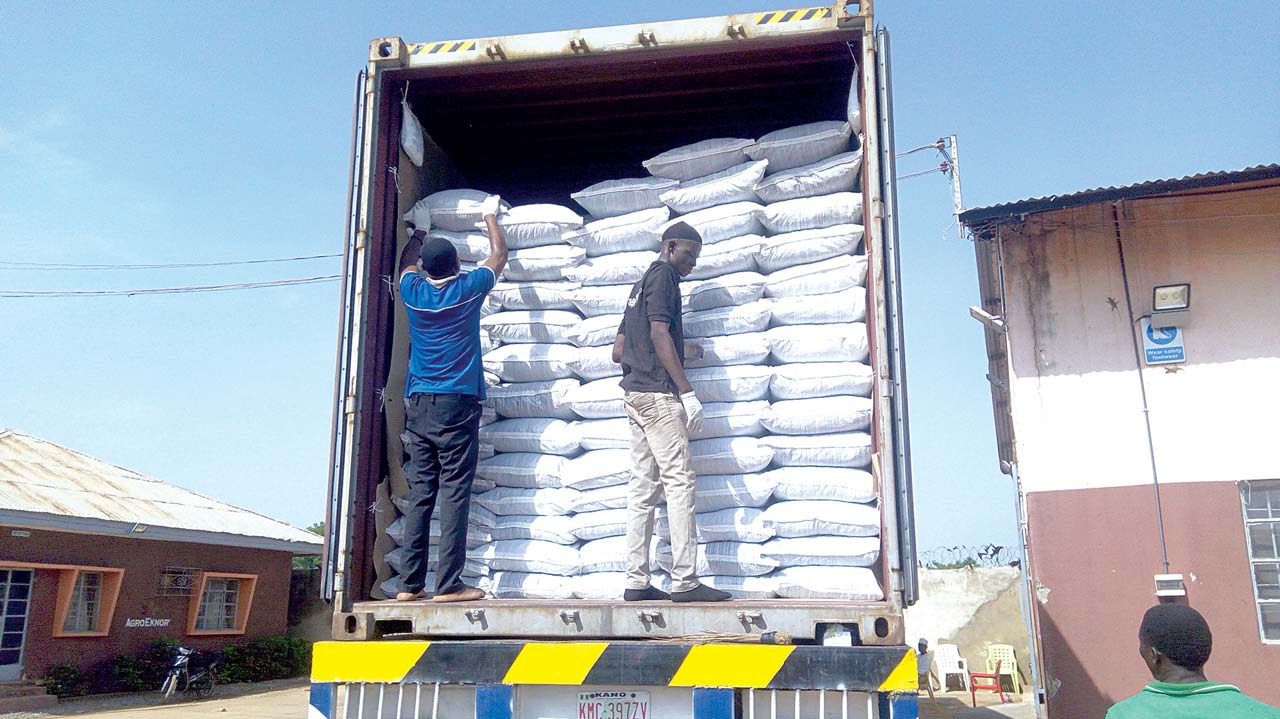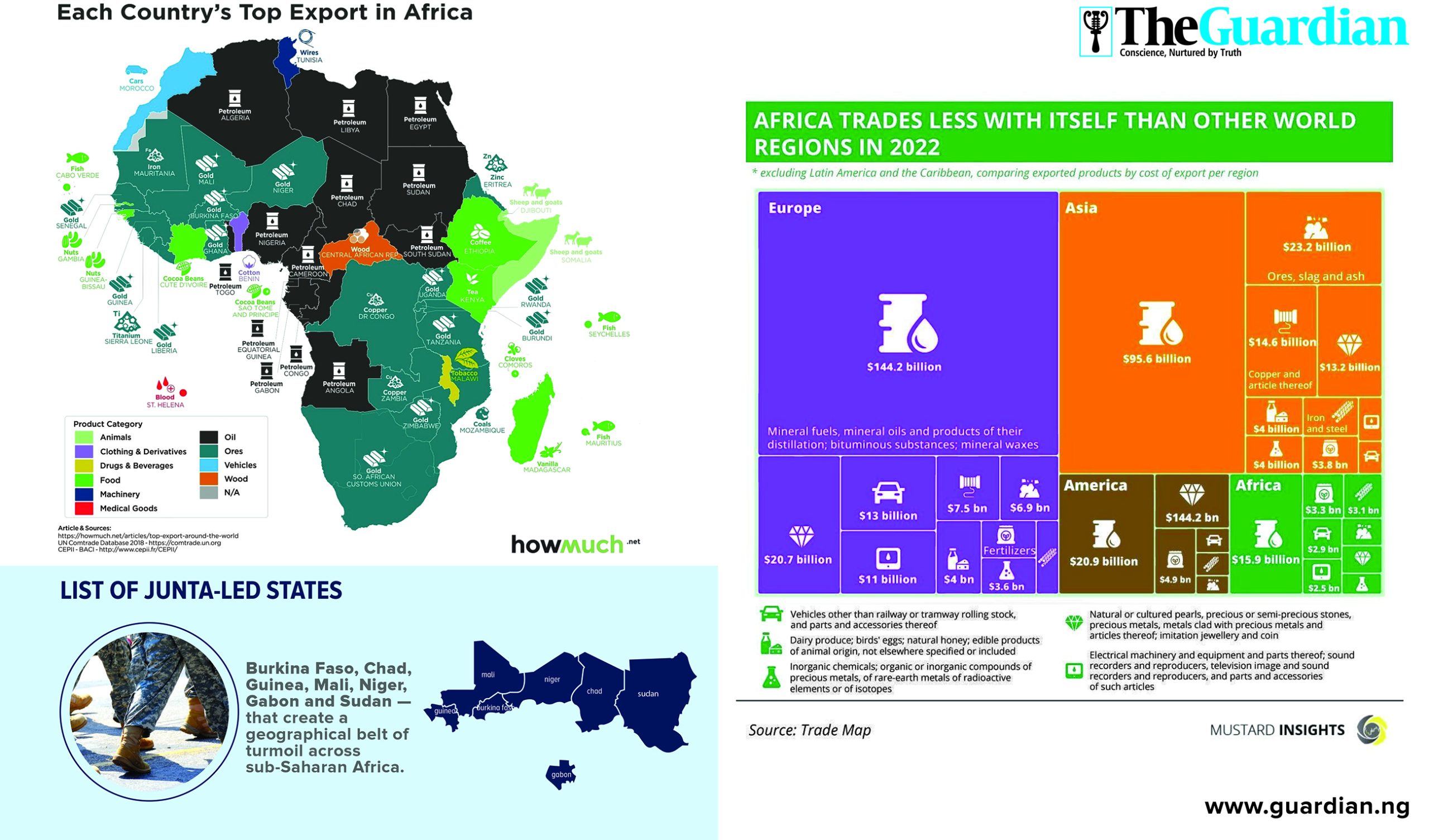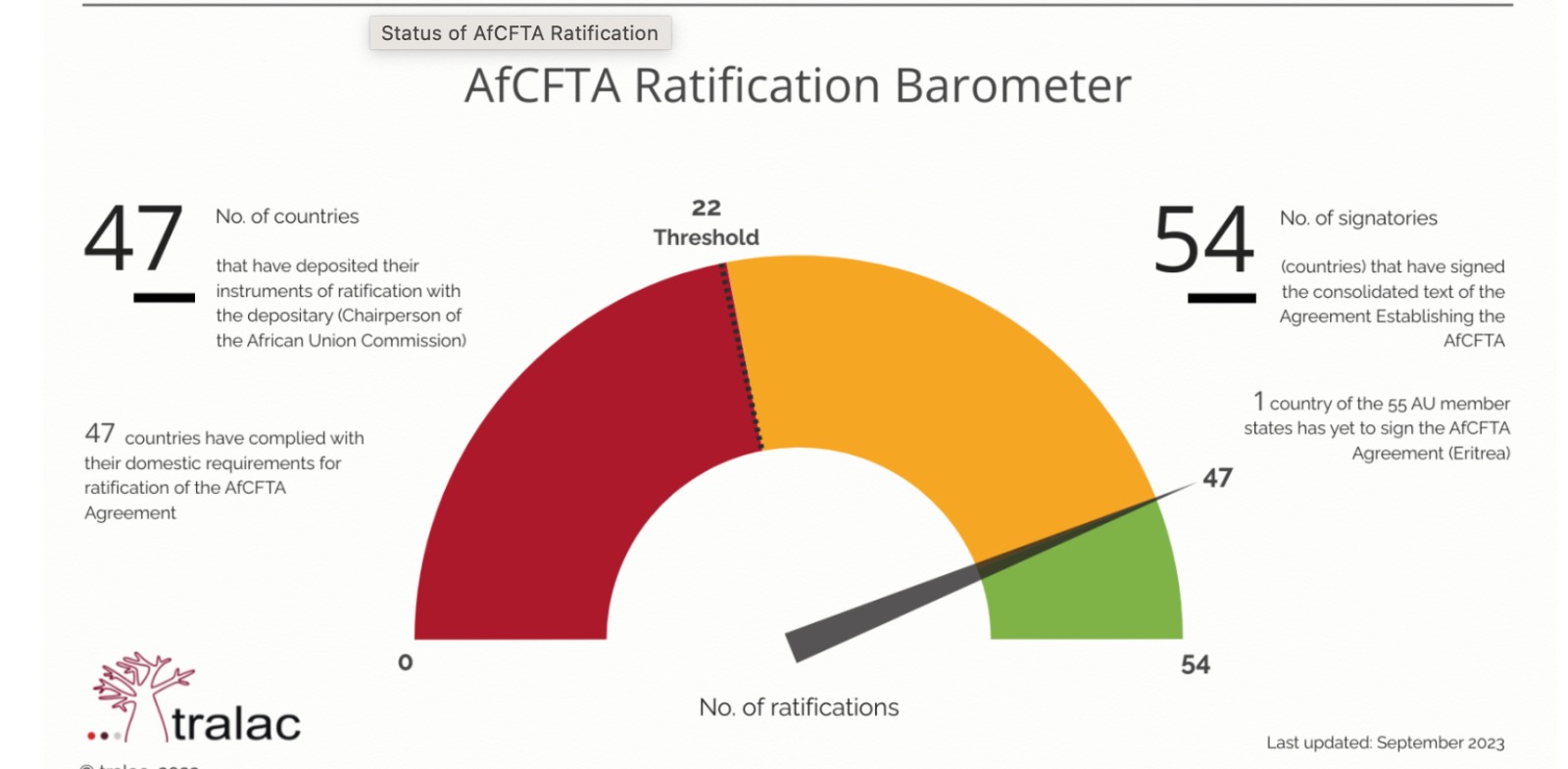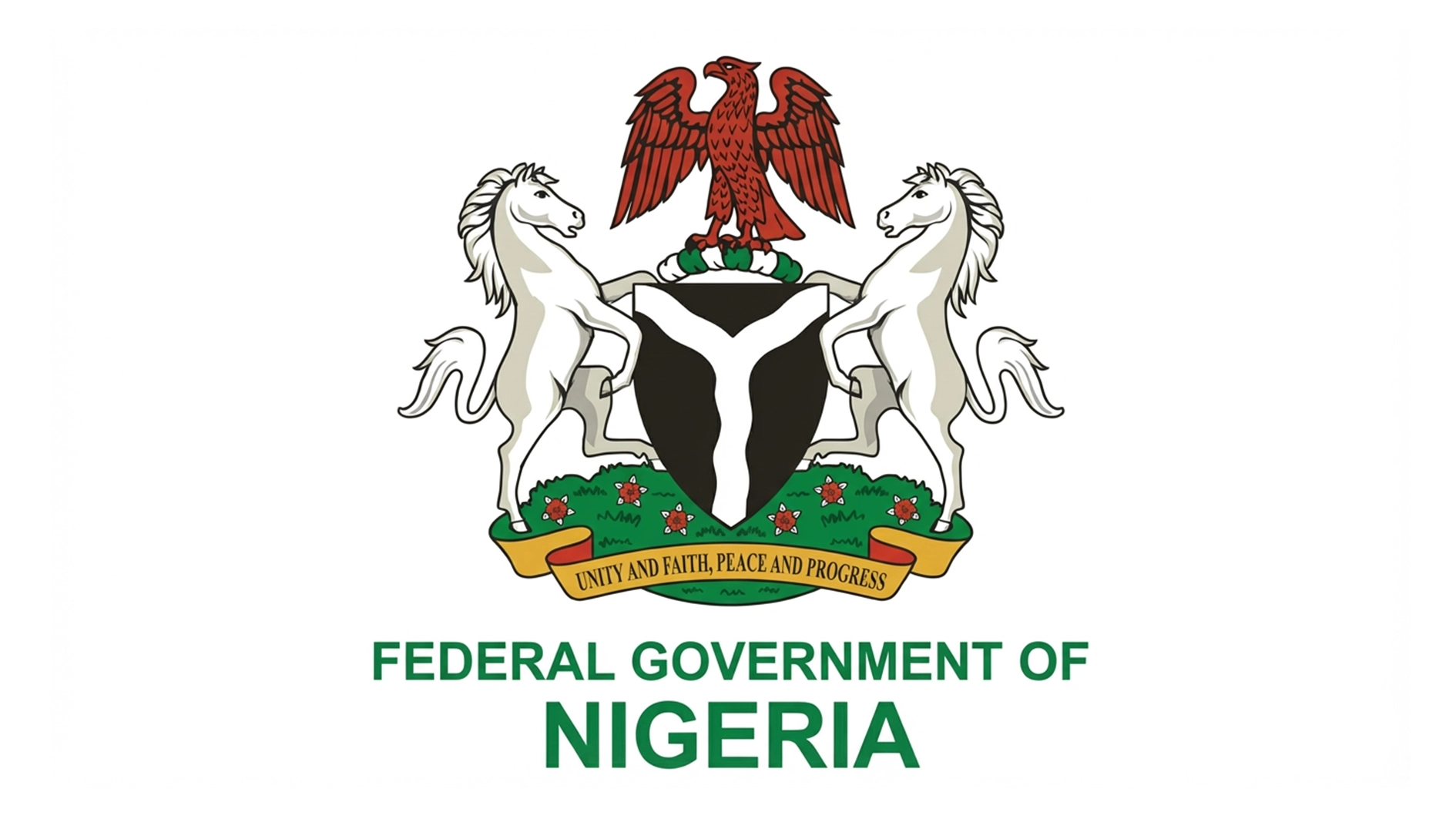
The recent tension over reported military takeover of the Congo Brazzaville government, though dismissed, shows that the contagion may continue to spread. With no end in sight to resurging military juntas and accompanying sanctions as well as reprisal actions, the prospect of improved trade among Africans appears to have been caught in the middle, TOBI AWODIPE writes.
The recent military coup in Niger and later Gabon has not only undermined democratic governance but also threatened to reverse the scanty gains of intra-continental trade under the African Continental Free Trade Agreement (AfCFTA), which is now in its third year of implementation. It also threatens trade treaties and agreements, creating an environment of uncertainty for businesses and investors in the affected countries with a spillover effect on neighbouring countries.
On August 10, a military junta declared a new government in Niger after seizing power on July 26 from the democratically elected president, Mohamed Bazoum, who has remained under house arrest.
On July 30, President Bola Tinubu, who is the chair of the Economic Community of West African States (ECOWAS) gave the coup leaders a one-week ultimatum to restore civil rule or face a military intervention from the regional bloc.
Similarly, military officers of Gabon followed–up the action of their Nigerien colleagues, taking power “on behalf of the people”, closing the borders and dissolving all institutions in the country. Alongside Gabon and Niger, Guinea, Burkina Faso, Mali, Chad and Sudan are now controlled by juntas that came to power through the means of guns, all but one in the past two years.
As a result of the coups, heavy trade and financial sanctions have been applied on Niger as France, Germany, European Union (UN) and the United States (US), have suspended aid programmes. The ECOWAS sanctions include the freezing of Nigerien assets, a ban on all commercial flights, cutting off its electricity supply, shutting down trade activities at all the country’s borders and suspending all commercial and financial transactions.
Africa’s loss is other regions’ gain
The bilateral trade deficit between Nigeria and Africa continues to widen in favour of the rest of the world, even more so in the last five years. Data sourced from the John Hopkins China-Africa Research Initiative revealed that China’s exports to Nigeria last year stood at $23.9 billion and $164.16 billion for the whole of Africa. Imports from Nigeria for the same time frame were just $1.6 billion, a deficit of over 22 million dollars.
 Nigeria was not even among the top 10 countries that exported to China in 2022 at just $375 million, according to the Nigerian Export Promotion Council (NEPC). In 2021, Nigeria was the largest buyer of Chinese goods, valued at $23 billion or N10 trillion followed by South Africa and Egypt while South Africa, Angola and the Democratic Republic of Congo (DRC) are the largest exporters to China.
Nigeria was not even among the top 10 countries that exported to China in 2022 at just $375 million, according to the Nigerian Export Promotion Council (NEPC). In 2021, Nigeria was the largest buyer of Chinese goods, valued at $23 billion or N10 trillion followed by South Africa and Egypt while South Africa, Angola and the Democratic Republic of Congo (DRC) are the largest exporters to China.
China is not the only beneficiary of the low trade volume among African countries. According to a September 2023 report by the UK’s Department for Business and Trade, the total trade in goods and services (exports plus imports) between the UK and Nigeria was £7.6 billion in Q1 2023, an increase of 48.4 per cent or £2.5 billion from Q1 of 2022. Of the £7.6 billion, total UK exports to Nigeria amounted to £4.3 billion while total UK imports from Nigeria amounted to £3.3 billion an increase of 78.1 per cent or £1.4 billion, compared to Q1 2022). Nigeria was the UK’s 37th largest trading partner in Q1 2023.
Data from the US Census Bureau also revealed that in 2021, the US exported goods worth $3.9 billion to Nigeria while imports from Nigeria stood at $3.5 billion. The figure was $3.4 billion.
Trading Economics revealed that EU imports from Nigeria stood at 29 billion Euros in 2022, while the total trade volume for the same time was 45 billion Euros.
Sadly, while Nigeria’s trade value with Europe, China, America and the rest of the world continues to thrive, it is the opposite for its trade with other African countries. The trade volume was N842.6 billion in the first quarter of 2023 (Q1 ‘23), 11.95 per cent down from N956.93 billion recorded in Q1 ‘22.
The NBS Foreign Trade in Goods Statistics Report for Q1 ’23 showed that at N842.6 billion, Nigeria’s intra-African trade represented just 6.99 per cent of its total foreign trade (N12.047 trillion). This is against the 7.4 per cent contribution to its total foreign trade (N13.001 trillion) in Q1 ‘22. On a quarter-on-quarter basis, Nigeria’s trade value with other African countries declined by 24.87 per cent to N842.6 billion in Q1 ‘23 from N1.122 trillion posted in Q4 ’22.
In stark contrast, trade volume between Nigeria and China rose to $5.4 billion in the quarter and is projected to rise even further by the end of the year.
Intra-African trade is the lowest in world trade, standing at around 15 per cent compared to approximately 66 per cent, 44 per cent and 63 per cent intra-regional in the case of Europe, North America and Asia/Oceania respectively.
 Further analysis showed that the trade volume in Africa has been on a steady decline since 2021 when AfCFTA kicked off. In 2020, the percentage of Nigeria’s trade with other African countries stood at 11.03 per cent and fell to 7.46 per cent in 2021 and went even further down to 6.5 per cent last year.
Further analysis showed that the trade volume in Africa has been on a steady decline since 2021 when AfCFTA kicked off. In 2020, the percentage of Nigeria’s trade with other African countries stood at 11.03 per cent and fell to 7.46 per cent in 2021 and went even further down to 6.5 per cent last year.
Although Nigeria ratified the AfCFTA Agreement in December 2020, its land borders have been mostly closed to neighbouring countries in the last three years, a contradiction of the regional trade treaties, which seek to simplify cross-border trade across Africa. This and many other reasons are a huge part of why trade within Africa remains very low while China continues to gain, experts have said.
How coups disrupt trade agreements
Stakeholders and trade experts say the effects of coups can disrupt existing trade agreements and treaties among countries, resulting in the suspension or renegotiation of trade deals and creating barriers to the free movement of goods, services and capital. Travel limitations by regional bodies and the closure of both land and air borders are among the aftermaths of coups. Nationwide curfews are regularly imposed during specified hours. As a result, trade activities have come to a standstill.
Ivy Wereh, a trade expert, said that considering Africa and West Africa’s aspiration for integration, Article Three of the Revised Treaty of ECOWAS outlines the imperative of dismantling trade barriers and aligning trade policies to establish a free trade area, customs union, common market, and eventual Monetary and Economic Union in West Africa. However, recent coups are going to disrupt the significant regional agreements, she said.
Speaking further, she said regional integration often involves the development of infrastructure projects such as roads, railways and energy networks and the ECOWAS Trade Liberalisation Scheme (ETLS) serves as the central framework for market integration and trade within the region and the whole of Africa. It encompasses protocols for the unhindered movement of goods, individuals, and transportation.
A notable example is the Abidjan-Lagos Trade and Transport Facilitation Programme, supported by the World Bank, which has proven beneficial to Benin Republic and Nigeria.
Notably, she added, Burkina Faso and Togo are also in the process of implementing this initiative. Nevertheless, the obstacles stemming from the insufficient execution of the ETLS within national boundaries are partly attributed to factors like recent coups and political instability that impede its effectiveness due to shifting priorities and uncertainty about the future direction of the country. Addressing these challenges is imperative to foster a more profound integration of trade and markets within the ECOWAS framework.
“Furthermore, impacted by these developments are critical sectors related to the region’s investments, particularly the key areas aimed at augmenting investment and competition policies. These encompass the establishment of the ECOWAS Common Investment Market, the active promotion of conducive investment climates, and the integration of financial markets. Illustratively, initiatives like the ECOWAS Investment Forum, alongside the provision of an online platform for monitoring the investment climate, are indicative of efforts being made in this direction,” she said.
Similarly, the suspension of multiple West African countries from ECOWAS not only presents a significant hurdle to the ongoing negotiations of the African Continental Free Trade Area (AfCFTA) but also introduces a substantial setback to the broader regional integration efforts, Blessing Irabor-Oza has said.
Irabor-Oza, the President of the Organisation of Women in International Trade (OWIT), said the suspension casts a shadow over the cooperative spirit necessary for realising the potential benefits of the AfCFTA, which aims to foster greater intra-African trade, boost economic growth, and enhance the collective bargaining power of African nations on the global stage.
“Besides, the exclusion of these countries from such a prominent regional economic community disrupts the harmonisation of trade policies and regulations across the region. This, in turn, undermines the seamless movement of goods, services, and investments that the AfCFTA seeks to achieve. The collaborative mechanisms and mutual trust necessary to ensure the success of the AfCFTA may be compromised as a result of these suspensions, potentially hampering the progress of this transformative initiative. AfCFTA’s objectives of boosting intra-African trade in goods and services are being severely undermined by the instability that plagues Africa. As a basic requirement, the flow of goods, services and investment across borders requires stability, peace and good governance.”
She regretted that the crisis with Niger has brought about a heavy crisis with trade that the country has been struggling with as traders have lost millions of Naira since the borders were shut. “I don’t know how this single market will be created now. The regional policies in place will be disrupted. Some people will be displaced and this entire region will be destabilised significantly. If care is not taken, it will become free for all and different groups will rise trying to seize power or form their government, affecting trade. When there is no peace, trade cannot exist. Economic structures will be affected, trade patterns and multilateral trade agreements will be affected.”
Adding that Niger doesn’t serve ECOWAS alone as it is a transit region to other countries, she said Nigeria makes up 40 per cent of trade activities that happen in Niger.
“Hundreds of millions of naira are at risk of being lost following the border closure. People’s livelihoods are being affected. Go to the border and see trucks just parked there. Many drivers are stuck in Niger and cannot leave while others that want to enter or pass through cannot do so as well. The result of this has been a sharp increase in the prices of goods. For instance, in Ghana, prices of perishables have shot up as goods cannot get there by land as those trucks pass through Niger.”
Adding that the seven northern states that make up the Trans-Sahara road corridor are most affected by this closure, she said business owners in those states are presently counting their losses which she said has run into millions of naira. “Nigeria has a micro-economy; can we survive this is what all of us should ask ourselves. Who will reimburse the traders for these losses? Food insecurity is looming and we will soon begin to feel the full effects,” she said.
Pointing out that AfCFTA negotiations would suffer setbacks, she urged dialogue and negotiations, adding that the sanctions are not working as force cannot be used to ‘cure’ force.
She warned that other countries may also experience coups soon if care is not taken and wondered how many countries would be expelled from the regional bloc and sanctions imposed.
“The coup leaders neither understand trade nor trade agreements so it is like starting over. I don’t think trade and economic sanctions are the solution, instead, agreements and negotiations should be considered. Now, people are looking for new routes to go to other African countries without going through Niger and now, Gabon, but you have to consider the distance and security. There is a disruption in the economy and many traders are confused about what to do.”
She urged the leaders to go back to the negotiation table in the interest of trade, reiterating that trade/economic sanctions alone cannot make the coup leaders do what ECOWAS is asking them to do.
Director of the Centre for the Promotion of Private Enterprise (CPPE), Muda Yusuf, regretted that trade disruption is going to be continental and not just regional. He pointed out that a major objective of ECOWAS and the other regional blocs is the promotion of economic and regional integration but things like coups, sanctions and border closures negate these objectives and defeat the purpose of trade and economic integration.
He said though AfCFTA was supposed to leverage regional trading blocs, the blocs are getting weaker and affecting its integration. “Fragmentation is now more pronounced than ever and is affecting not just AfCFTA but West African trade adversely. ECOWAS’ role is slowly being eroded and trade negotiations run the risk of being disrespected or even ignored. Some countries under the military regime in the ECOWAS region may decide to walk out completely and if this happens, the regional body will be weakened even more and cease to be an economic bloc.”
Yusuf said most of the trade that happens at the borders is informal and is not even captured under an official database. “Traders in both Niger and Nigeria that do business at the borders are already seriously affected by the closures as a lot of informal cross-border trade happens there every day. There is also the issue of the closure of the air space which has shot up the price of air travel significantly. In a bid to avoid Niger, flights have to pass longer routes and we all know that when airfare increases, it will affect the cost of air-freighted goods.”
Stressing the importance of political stability to maintain and foster trade, he said it is mostly citizens that bear the brunt of instability. “Politicians are never affected but traders, business owners and everyday citizens are the ones that suffer. Ask the people of Niger, they do not care for this problem and simply want a stable environment where they can do business in peace.”
Pointing out that the coup and political instability have increased the risk of trading and made the costs of trade significantly higher, he said by the time goods get into or through Niger, the add-on costs would be exorbitant for the average citizen. He said the electricity sanctions in place are already affecting businesses and the situation was only going to deteriorate further. “There are also fears of investing, no investor wants to put money in a country or region that is not stable and this will negatively affect income, Forex, GDP and other key economic indicators negatively. Every country needs Foreign Direct Investment (FDI), even advanced economies and a country that is already struggling before which now adds political instability to the mix is headed for serious disaster,” he said.
Uju Uzo-Ojinnaka, Chief Executive Officer (CEO) at Traders of Africa (TOFA), said no country is an island and what happens in one African country affects others. Uzo-Ojinnaka who seeks to improve trade between Africa and the world through technology, regretted that the coups and instability will lead to a loss of investors’ confidence.
She added that buyers will be wary of buying and the few that want to buy will make all kinds of demands on the sellers and want to take advantage of them. She said sellers will also be affected as they desperately try to offload goods before they rot/expire.
“Gabon borders Cameroon, the Republic of Congo and Equatorial Guinea, and traders in those countries will find it difficult to move goods. We may think it doesn’t affect us in Nigeria, but this is not true as we are all interconnected.”
She pointed out that AfCFTA, which is supposed to be a unified market for 1.3 billion people, is being rapidly depleted as a result of political instability and sanctions. “There must be peace for trade to thrive and leaders must find a way to resolve this peacefully, if not, African trade will be in trouble. It is not just Gabon or Niger that will be affected, the whole of Africa will be affected as well because nobody is going to a war-torn or unstable environment to do business. No genuine trader wants to put money where there is trouble, they would rather go to more stable areas to do business. What will now happen to traders in West Africa? Farmers in those places are going to lose a lot of money because people are more concerned with staying alive or moving away. Political instability doesn’t do anyone any good.”
She said trade negotiations may not be affected so much for now and doesn’t foresee any disruption but depends also on those doing the negotiations. “MSMEs and manufacturers are the major players in AfCFTA and not the government. International traders will simply look for other countries to trade with and avoid West Africa. We do not want anyone to be exempted but trade will continue no matter what. Trading is as old as time and will continue, just without us. No matter the sanctions handed out to the affected countries, people will still look for ways to circumvent the sanctions despite the risks.”
She said this will unfortunately increase the cost of trade significantly as traders look for ways around the sanctions to do business. “We wish these issues are not here with us but they are and we will continue to make do with the situation we have been dealt with as best as possible. We hope all parties will come to a peaceful resolution so that trade and business activities can continue uninterrupted,” she said.
Irabor-Oza opined that trade and commercial activities are key to any nation’s survival and can only flourish when borders and air spaces are open, not closed, as is now the case on the border between Niger and Nigeria, and Gabon. “The disruptions of trade flows due to military conflicts can lead to changes in economic structures of countries, to subsequent changes in trade policies, a waste of resources, and to the disruption of established trade patterns in regional and multilateral trade agreements. Trade liberalisation and deeper integration in the West African region are also being threatened. Even before the coup, 4.3 million people were dependent on international aid and 3.3 million were food insecure. Going forward, the successful implementation of AfCFTA will be dependent on the extent to which political stability and good governance can be guaranteed across the continent. The AU, ECOWAS, and other regional bodies must work together to address the underlying causes of political instability and promote democratic governance. Also, after the coups that have taken place so far, AfCFTA must go back to the drawing board and rethink sustainable trade policies so that no matter what happens shortly, trade policies and activities must remain unaffected to protect trade and businesses as well as business owners,” she concluded.






